外研版八年级英语上册Module 11 Way of life同步讲练+课后自测(含答案)
文档属性
| 名称 | 外研版八年级英语上册Module 11 Way of life同步讲练+课后自测(含答案) | 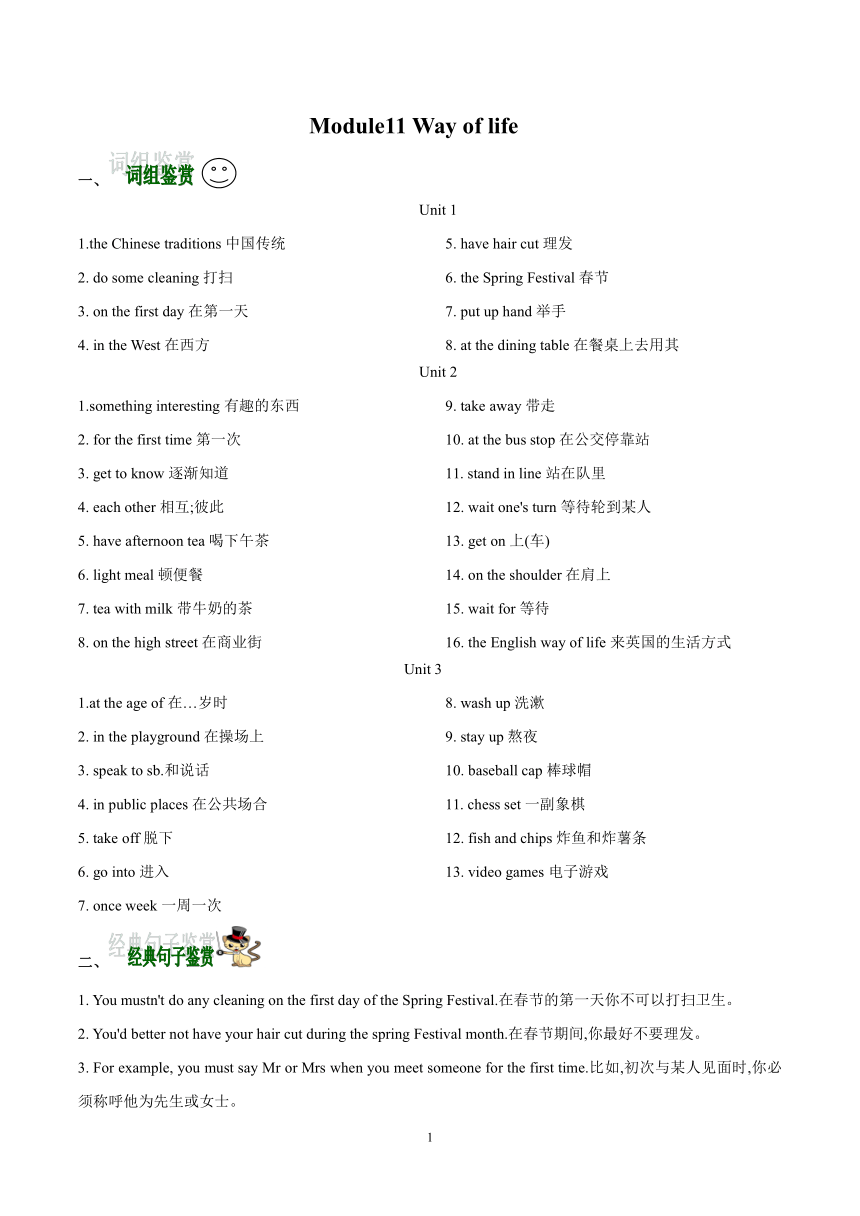 | |
| 格式 | doc | ||
| 文件大小 | 697.0KB | ||
| 资源类型 | 教案 | ||
| 版本资源 | 外研版 | ||
| 科目 | 英语 | ||
| 更新时间 | 2022-06-25 15:15:35 | ||
图片预览

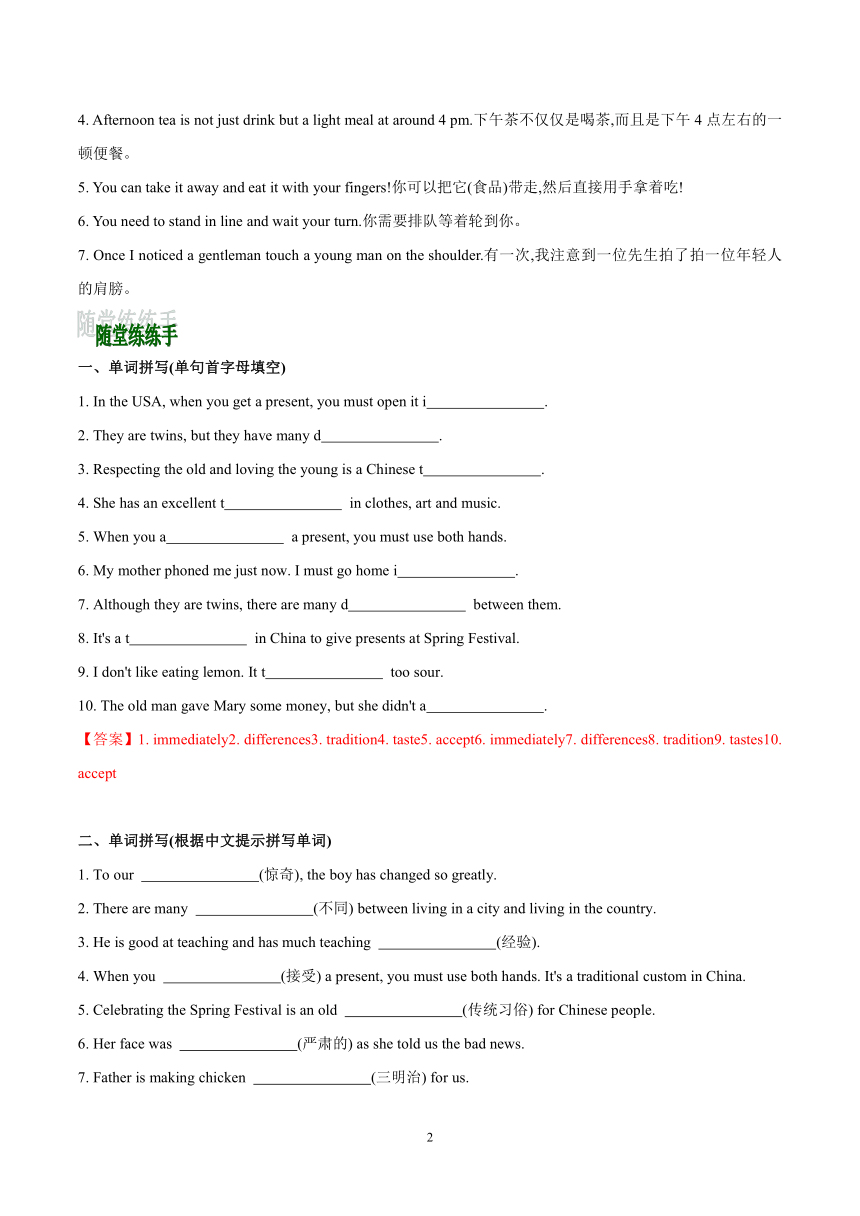
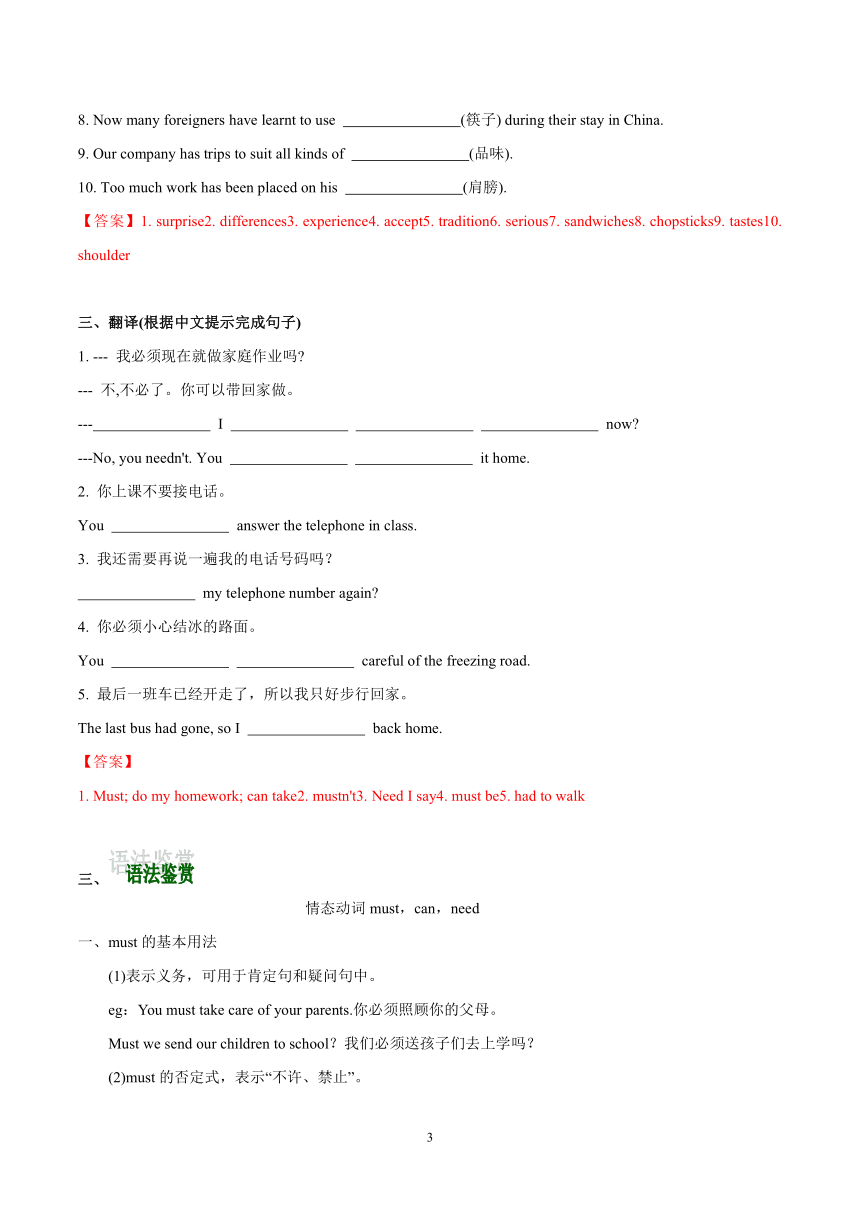
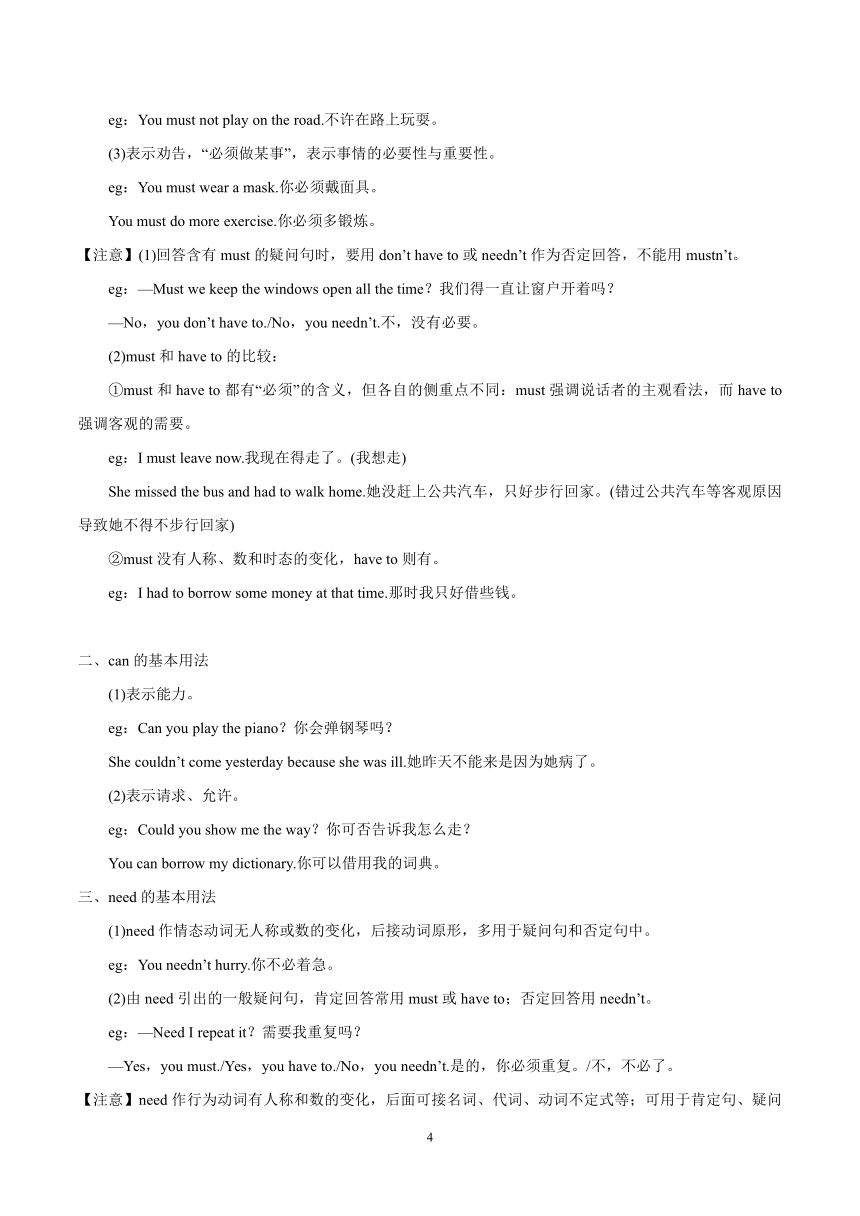
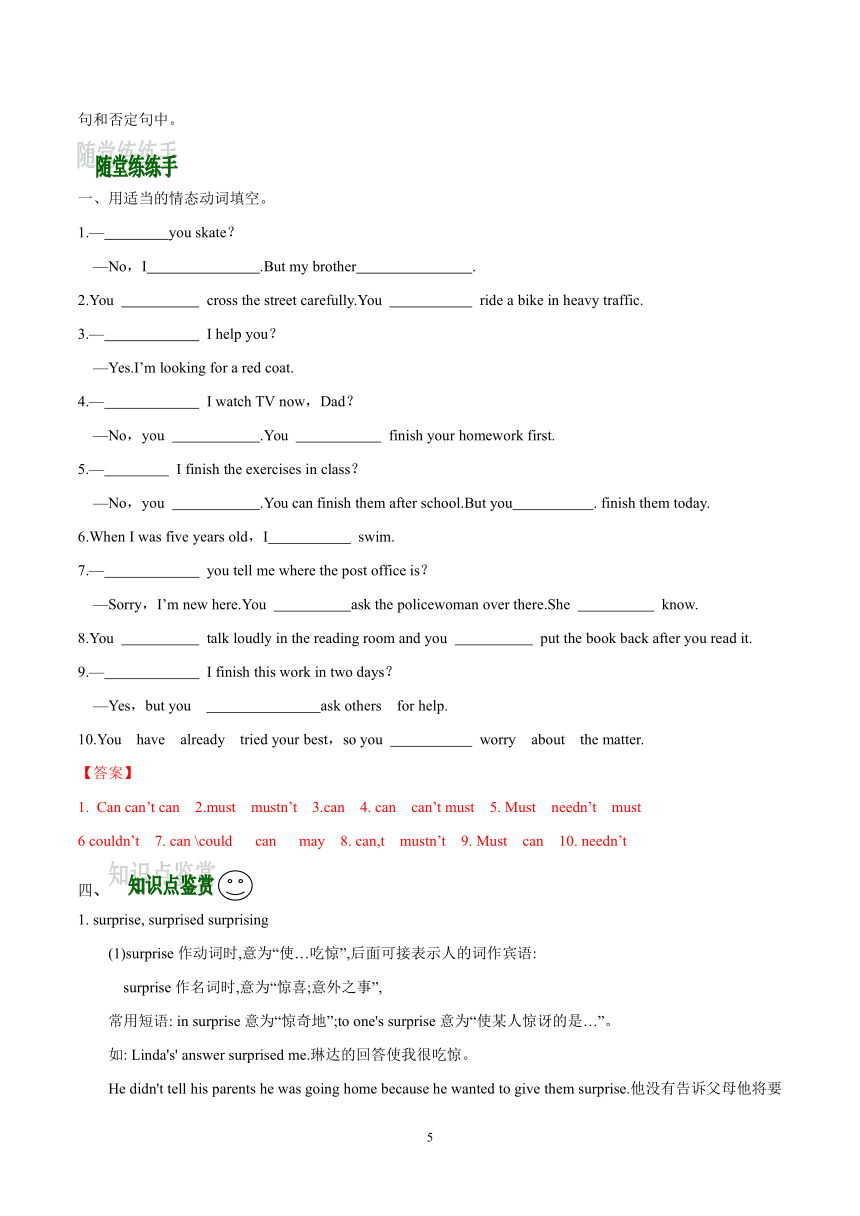
文档简介
Module11 Way of life
1、
Unit 1
1.the Chinese traditions中国传统
2. do some cleaning打扫
3. on the first day在第一天
4. in the West在西方
5. have hair cut理发
6. the Spring Festival春节
7. put up hand举手
8. at the dining table在餐桌上去用其
Unit 2
1.something interesting有趣的东西
2. for the first time第一次
3. get to know逐渐知道
4. each other相互;彼此
5. have afternoon tea喝下午茶
6. light meal顿便餐
7. tea with milk带牛奶的茶
8. on the high street在商业街
9. take away带走
10. at the bus stop在公交停靠站
11. stand in line站在队里
12. wait one's turn等待轮到某人
13. get on上(车)
14. on the shoulder在肩上
15. wait for等待
16. the English way of life来英国的生活方式
Unit 3
1.at the age of在…岁时
2. in the playground在操场上
3. speak to sb.和说话
4. in public places在公共场合
5. take off脱下
6. go into进入
7. once week一周一次
8. wash up洗漱
9. stay up熬夜
10. baseball cap棒球帽
11. chess set一副象棋
12. fish and chips炸鱼和炸薯条
13. video games电子游戏
2、
3、
1. You mustn't do any cleaning on the first day of the Spring Festival.在春节的第一天你不可以打扫卫生。
2. You'd better not have your hair cut during the spring Festival month.在春节期间,你最好不要理发。
3. For example, you must say Mr or Mrs when you meet someone for the first time.比如,初次与某人见面时,你必须称呼他为先生或女士。
4. Afternoon tea is not just drink but a light meal at around 4 pm.下午茶不仅仅是喝茶,而且是下午4点左右的一顿便餐。
5. You can take it away and eat it with your fingers!你可以把它(食品)带走,然后直接用手拿着吃!
6. You need to stand in line and wait your turn.你需要排队等着轮到你。
7. Once I noticed a gentleman touch a young man on the shoulder.有一次,我注意到一位先生拍了拍一位年轻人的肩膀。
一、单词拼写(单句首字母填空)
1. In the USA, when you get a present, you must open it i .
2. They are twins, but they have many d .
3. Respecting the old and loving the young is a Chinese t .
4. She has an excellent t in clothes, art and music.
5. When you a a present, you must use both hands.
6. My mother phoned me just now. I must go home i .
7. Although they are twins, there are many d between them.
8. It's a t in China to give presents at Spring Festival.
9. I don't like eating lemon. It t too sour.
10. The old man gave Mary some money, but she didn't a .
【答案】1. immediately2. differences3. tradition4. taste5. accept6. immediately7. differences8. tradition9. tastes10. accept
二、单词拼写(根据中文提示拼写单词)
1. To our (惊奇), the boy has changed so greatly.
2. There are many (不同) between living in a city and living in the country.
3. He is good at teaching and has much teaching (经验).
4. When you (接受) a present, you must use both hands. It's a traditional custom in China.
5. Celebrating the Spring Festival is an old (传统习俗) for Chinese people.
6. Her face was (严肃的) as she told us the bad news.
7. Father is making chicken (三明治) for us.
8. Now many foreigners have learnt to use (筷子) during their stay in China.
9. Our company has trips to suit all kinds of (品味).
10. Too much work has been placed on his (肩膀).
【答案】1. surprise2. differences3. experience4. accept5. tradition6. serious7. sandwiches8. chopsticks9. tastes10. shoulder
三、翻译(根据中文提示完成句子)
1. --- 我必须现在就做家庭作业吗
--- 不,不必了。你可以带回家做。
--- I now
---No, you needn't. You it home.
2. 你上课不要接电话。
You answer the telephone in class.
3. 我还需要再说一遍我的电话号码吗?
my telephone number again
4. 你必须小心结冰的路面。
You careful of the freezing road.
5. 最后一班车已经开走了,所以我只好步行回家。
The last bus had gone, so I back home.
【答案】
1. Must; do my homework; can take2. mustn't3. Need I say4. must be5. had to walk
4、
情态动词must,can,need
一、must的基本用法
(1)表示义务,可用于肯定句和疑问句中。
eg:You must take care of your parents.你必须照顾你的父母。
Must we send our children to school?我们必须送孩子们去上学吗?
(2)must的否定式,表示“不许、禁止”。
eg:You must not play on the road.不许在路上玩耍。
(3)表示劝告,“必须做某事”,表示事情的必要性与重要性。
eg:You must wear a mask.你必须戴面具。
You must do more exercise.你必须多锻炼。
【注意】(1)回答含有must的疑问句时,要用don’t have to或needn’t作为否定回答,不能用mustn’t。
eg:—Must we keep the windows open all the time?我们得一直让窗户开着吗?
—No,you don’t have to./No,you needn’t.不,没有必要。
(2)must和have to的比较:
①must和have to都有“必须”的含义,但各自的侧重点不同:must强调说话者的主观看法,而have to强调客观的需要。
eg:I must leave now.我现在得走了。(我想走)
She missed the bus and had to walk home.她没赶上公共汽车,只好步行回家。(错过公共汽车等客观原因导致她不得不步行回家)
②must没有人称、数和时态的变化,have to则有。
eg:I had to borrow some money at that time.那时我只好借些钱。
二、can的基本用法
(1)表示能力。
eg:Can you play the piano?你会弹钢琴吗?
She couldn’t come yesterday because she was ill.她昨天不能来是因为她病了。
(2)表示请求、允许。
eg:Could you show me the way?你可否告诉我怎么走?
You can borrow my dictionary.你可以借用我的词典。
三、need的基本用法
(1)need作情态动词无人称或数的变化,后接动词原形,多用于疑问句和否定句中。
eg:You needn’t hurry.你不必着急。
(2)由need引出的一般疑问句,肯定回答常用must或have to;否定回答用needn’t。
eg:—Need I repeat it?需要我重复吗?
—Yes,you must./Yes,you have to./No,you needn’t.是的,你必须重复。/不,不必了。
【注意】need作行为动词有人称和数的变化,后面可接名词、代词、动词不定式等;可用于肯定句、疑问句和否定句中。
一、用适当的情态动词填空。
1.— you skate?
—No,I .But my brother .
2.You cross the street carefully.You ride a bike in heavy traffic.
3.— I help you?
—Yes.I’m looking for a red coat.
4.— I watch TV now,Dad?
—No,you .You finish your homework first.
5.— I finish the exercises in class?
—No,you .You can finish them after school.But you . finish them today.
6.When I was five years old,I swim.
7.— you tell me where the post office is?
—Sorry,I’m new here.You ask the policewoman over there.She know.
8.You talk loudly in the reading room and you put the book back after you read it.
9.— I finish this work in two days?
—Yes,but you ask others for help.
10.You have already tried your best,so you worry about the matter.
【答案】
1. Can can’t can 2.must mustn’t 3.can 4. can can’t must 5. Must needn’t must
6 couldn’t 7. can \could can may 8. can,t mustn’t 9. Must can 10. needn’t
四、
1. surprise, surprised surprising
(1)surprise作动词时,意为“使…吃惊”,后面可接表示人的词作宾语:
surprise作名词时,意为“惊喜;意外之事”,
常用短语: in surprise意为“惊奇地”;to one's surprise意为“使某人惊讶的是…”。
如: Linda's' answer surprised me.琳达的回答使我很吃惊。
He didn't tell his parents he was going home because he wanted to give them surprise.他没有告诉父母他将要回家,因为他想给他们一个惊喜。
The boy looked at me in surprise, and couldn't believe that was back.这个男孩吃惊地看着我,不相信我回来了。
To our surprise, the girl won the match at last.使我们吃惊的是,这个女孩最后赢得了比赛。
(2) surprised和 surprising都是形容词,
用法区别在于 surprised意为“对感到惊奇”,主语习惯上是人,短语 be surprised at意为“对…感到吃惊”;surprising意为“令人惊讶的”,作表语时主语习惯上是物。
如:I was surprised at his answer.我对他的回答感到吃惊。
Your success is surprising.你们的成功令人吃惊。
2. different的用法
(1)different形容词,意为“不同的,常用短语 be different from意为“与不同”。
difference是 different的名词形式,意为“差别;差异”,它既是可数名词,也是不可数名词,常与 between..and..连用,意为…与之间的不同之处”。
如:My cup is different from yours.我的杯子与你的不一样。
Can you tell the difference between the twins 你能区分这对双胞胎吗
(2)different反义词是same,常用短语: the same as..意为“和一样”。
如: The weather of this year is not the same as that of the past years.今年的气候同往年的不一样。
3. accept与 receive
accept和 receive都为动词,都有“收到”之意,但它们也有区别:,,
(1) accept为及物动词,意为“接受”,强调经过主语的考虑而接受,是主观上的“接受”。
如:Lily received Jim's invitation but she didn't accept.莉莉收到吉姆的请柬,但她并没有接受。
(2) receive为及物动词,意为“接收;收到”,侧重于行为本身,不涉及收到者是否同意的情况,是客观上的“收到”。
如: The computer is the best gift that I have ever received这台电脑是我收到的最好的礼物。
请根据句意用括号内所给单词的适当形式填空。
1. My brother enjoys ______ (chat) with friends on the Internet.
2. John _____ (hang) his clothes on the wall and went out of the room.
3. I prefer western food like _______ (sandwich) to Chinese food.
4. It’s so ______ (noise) that I can’t hear what you say on the bus.
5. My sister often help my mother do some________ (clean) at home at the weekend.
6. The boy fell off the bike and hurt himself badly. We must send him to hospital ______ (immediate).
7. Mid Autumn Festival is a _______ (traditionally) festival in China.
8. It’s time for class. You must stop _______ (sleep).
9.I heard two girls ________ (speak)English in the next room.
10. We will go to Mount Tai if it ________ (not snow)this weekend.
【答案】1.chatting 2.hung 3.sandwiches 4.noisy5.cleaning 6.immediately 7.traditional 8.sleeping 9.speaking 10.doesn’t snow
句型转换:根据题后括号内的要求改写句子,每空一词。
1. Tom put some food on the plate. (对划线部分提问)
_____ ______ food ______ Tom put on the plate
2. Listen to the teacher carefully. (改为否定句)
______ ______ to the teacher carefully.
3. We don’t have to clean the windows. (改为同义句)
We ______ _______ the windows.
4. The twins watch TV twice a week. (对划线部分提问)
______ _______ do the twins watch TV
5. The customs in China aren’t the same as those in England. (改为同义句)
The customs in China _______ ______ ______ those in England.
【答案】 1.How much; did2. Don’t listen 3.needn’t clean 4. How often
5. are different from
请根据所给汉语意思完成下列英语句子,每空一词。
1.我收到了汤姆送的礼物,但是我不能接受。
I have ______ a present from Tom, but I can’t ______ it.
2.史密斯小姐上个月结的婚。
Miss Smith ______ _____last month.
3.不要到处扔垃圾,你应该把它放在垃圾箱里。
Don’t ______ ______ everywhere and you must put it in the waste bin.
4.詹姆斯老师对我们大声喊道:“不要在街上踢足球!”
Mr. James ______ ______ ______us, “Don’t play football in the street!”
5.在周末,我经常帮妈妈洗餐具。
I often help my mother ______ ______ at the weekend.
【答案】1.received; accept 2.got married 3.drop litter 4.shouted/ shouts loudly at 5.wash up
五、
今天英语写作课的话题是介绍一下你家乡的风俗习惯,请根据以下要点提示,写一篇英语短文。
提示:1.What do you do when you meet people for the first time?
2.What kind of food and drink do you serve(提供) people when they come to your home?
3.What do you eat during the Spring Festival?
要求:1.语句通顺,条理清楚;
2.包含以上所有信息,可适当发挥;
3.不少于60词。
Let me introduce some customs in my home town to you.My home town is Suzhou.When we meet people for the first time,we usually smile at them and shake hands with them.After knowing them better,we can just call their first names.When it comes to food and drinks given to serve people in our homes,we generally prepare some fresh fruits and tea.
六、
一、根据汉语提示拼写单词
1. School is over. Let's have game of (国际象棋)
2. My father bought a (一套) of tools yesterday afternoon
3. You'd better use (筷子) instead of knife and fork
4. During my (逗留) in your country, visited many schools.
5. The journey will take (大约) twelve days.
6. At the bus stop, you must not (推) your way onto the bus.
7. You can't be (认真严肃的).
8. What is one (例子) of the English way of life
9. Have you done (任何事情) to help the little boy
10. Do you know who (打破) the window just now
【答案】 1. chess2.set 3. chopsticks4.stay5 around 6. push 7. serious 8. example. 9.anything10. broke
二、根据汉语意思完成句子
1.在中国,新年的第一天你不可以打扫卫生。
In China, you cleaning on the first day of New Year.
2.当你收到礼物时必须用双手
When you accept present, you your both hands.
3.我们可以用左手吃饭。
We eat meals our left hands.
4.你不能先倒牛奶。
You the milk in first.
5.在美国,当有人给你礼物时,没必要等下打开。
In the USA, when someone gives you present, you to open it later.
【答案】 1. mustn't do any2. must use3.can,with 4. can't put 5. needn't wait
三、用方框中所给词或短语的适当形式填空。每词限用一次
1.You finish your homework first, or you can't go out.
2. -Must I do it now -No, you .You do it later.
3. Life in the future be nicer and nicer.
4 I come in -e in, please.
5. My mother is ill and I look after her.
6 we go home now, Jenny
7. As a student, you try your best to study.
【答案】 1.must2. needn't , can3.will4.May 5. have to 6. Shall 7.should
四、语法填空
阅读下面短文,在空白处填入一个适当的词,或填入括号中所给单词的正确形式。
Different 1 (country) have different traditions. Do you know2 (something)about American traditions Now, let's have 3 look.
In America, just 4 in Europe, men usually open doors for women. And women always walk ahead of men into a room or a restaurant.5 , men walk ahead of women when they have to be ahead of the women 6 (choose)the table, to open the door of a car or do some other things like the above. On the street, men almost always walk or cross the street on the closer side of the women to the traffic. But if a man walks with two women, he should walk 7 them. Then if the host(男主人) or hostess or both of 8 (they)come in a car to get their guest for dinner, the guest should sit at the front seat and leave the back seat, though there are no people 9 (sit)on it.
Have you got it 10 (not)forget it! And then you'll have a better time in America.
【答案】
1.countries 2anything 3.a 4.as 5. However 6. to choose 7. between 8. them 9. sitting 10. Don't
can may should must needn't will shall have to
PAGE
1
1、
Unit 1
1.the Chinese traditions中国传统
2. do some cleaning打扫
3. on the first day在第一天
4. in the West在西方
5. have hair cut理发
6. the Spring Festival春节
7. put up hand举手
8. at the dining table在餐桌上去用其
Unit 2
1.something interesting有趣的东西
2. for the first time第一次
3. get to know逐渐知道
4. each other相互;彼此
5. have afternoon tea喝下午茶
6. light meal顿便餐
7. tea with milk带牛奶的茶
8. on the high street在商业街
9. take away带走
10. at the bus stop在公交停靠站
11. stand in line站在队里
12. wait one's turn等待轮到某人
13. get on上(车)
14. on the shoulder在肩上
15. wait for等待
16. the English way of life来英国的生活方式
Unit 3
1.at the age of在…岁时
2. in the playground在操场上
3. speak to sb.和说话
4. in public places在公共场合
5. take off脱下
6. go into进入
7. once week一周一次
8. wash up洗漱
9. stay up熬夜
10. baseball cap棒球帽
11. chess set一副象棋
12. fish and chips炸鱼和炸薯条
13. video games电子游戏
2、
3、
1. You mustn't do any cleaning on the first day of the Spring Festival.在春节的第一天你不可以打扫卫生。
2. You'd better not have your hair cut during the spring Festival month.在春节期间,你最好不要理发。
3. For example, you must say Mr or Mrs when you meet someone for the first time.比如,初次与某人见面时,你必须称呼他为先生或女士。
4. Afternoon tea is not just drink but a light meal at around 4 pm.下午茶不仅仅是喝茶,而且是下午4点左右的一顿便餐。
5. You can take it away and eat it with your fingers!你可以把它(食品)带走,然后直接用手拿着吃!
6. You need to stand in line and wait your turn.你需要排队等着轮到你。
7. Once I noticed a gentleman touch a young man on the shoulder.有一次,我注意到一位先生拍了拍一位年轻人的肩膀。
一、单词拼写(单句首字母填空)
1. In the USA, when you get a present, you must open it i .
2. They are twins, but they have many d .
3. Respecting the old and loving the young is a Chinese t .
4. She has an excellent t in clothes, art and music.
5. When you a a present, you must use both hands.
6. My mother phoned me just now. I must go home i .
7. Although they are twins, there are many d between them.
8. It's a t in China to give presents at Spring Festival.
9. I don't like eating lemon. It t too sour.
10. The old man gave Mary some money, but she didn't a .
【答案】1. immediately2. differences3. tradition4. taste5. accept6. immediately7. differences8. tradition9. tastes10. accept
二、单词拼写(根据中文提示拼写单词)
1. To our (惊奇), the boy has changed so greatly.
2. There are many (不同) between living in a city and living in the country.
3. He is good at teaching and has much teaching (经验).
4. When you (接受) a present, you must use both hands. It's a traditional custom in China.
5. Celebrating the Spring Festival is an old (传统习俗) for Chinese people.
6. Her face was (严肃的) as she told us the bad news.
7. Father is making chicken (三明治) for us.
8. Now many foreigners have learnt to use (筷子) during their stay in China.
9. Our company has trips to suit all kinds of (品味).
10. Too much work has been placed on his (肩膀).
【答案】1. surprise2. differences3. experience4. accept5. tradition6. serious7. sandwiches8. chopsticks9. tastes10. shoulder
三、翻译(根据中文提示完成句子)
1. --- 我必须现在就做家庭作业吗
--- 不,不必了。你可以带回家做。
--- I now
---No, you needn't. You it home.
2. 你上课不要接电话。
You answer the telephone in class.
3. 我还需要再说一遍我的电话号码吗?
my telephone number again
4. 你必须小心结冰的路面。
You careful of the freezing road.
5. 最后一班车已经开走了,所以我只好步行回家。
The last bus had gone, so I back home.
【答案】
1. Must; do my homework; can take2. mustn't3. Need I say4. must be5. had to walk
4、
情态动词must,can,need
一、must的基本用法
(1)表示义务,可用于肯定句和疑问句中。
eg:You must take care of your parents.你必须照顾你的父母。
Must we send our children to school?我们必须送孩子们去上学吗?
(2)must的否定式,表示“不许、禁止”。
eg:You must not play on the road.不许在路上玩耍。
(3)表示劝告,“必须做某事”,表示事情的必要性与重要性。
eg:You must wear a mask.你必须戴面具。
You must do more exercise.你必须多锻炼。
【注意】(1)回答含有must的疑问句时,要用don’t have to或needn’t作为否定回答,不能用mustn’t。
eg:—Must we keep the windows open all the time?我们得一直让窗户开着吗?
—No,you don’t have to./No,you needn’t.不,没有必要。
(2)must和have to的比较:
①must和have to都有“必须”的含义,但各自的侧重点不同:must强调说话者的主观看法,而have to强调客观的需要。
eg:I must leave now.我现在得走了。(我想走)
She missed the bus and had to walk home.她没赶上公共汽车,只好步行回家。(错过公共汽车等客观原因导致她不得不步行回家)
②must没有人称、数和时态的变化,have to则有。
eg:I had to borrow some money at that time.那时我只好借些钱。
二、can的基本用法
(1)表示能力。
eg:Can you play the piano?你会弹钢琴吗?
She couldn’t come yesterday because she was ill.她昨天不能来是因为她病了。
(2)表示请求、允许。
eg:Could you show me the way?你可否告诉我怎么走?
You can borrow my dictionary.你可以借用我的词典。
三、need的基本用法
(1)need作情态动词无人称或数的变化,后接动词原形,多用于疑问句和否定句中。
eg:You needn’t hurry.你不必着急。
(2)由need引出的一般疑问句,肯定回答常用must或have to;否定回答用needn’t。
eg:—Need I repeat it?需要我重复吗?
—Yes,you must./Yes,you have to./No,you needn’t.是的,你必须重复。/不,不必了。
【注意】need作行为动词有人称和数的变化,后面可接名词、代词、动词不定式等;可用于肯定句、疑问句和否定句中。
一、用适当的情态动词填空。
1.— you skate?
—No,I .But my brother .
2.You cross the street carefully.You ride a bike in heavy traffic.
3.— I help you?
—Yes.I’m looking for a red coat.
4.— I watch TV now,Dad?
—No,you .You finish your homework first.
5.— I finish the exercises in class?
—No,you .You can finish them after school.But you . finish them today.
6.When I was five years old,I swim.
7.— you tell me where the post office is?
—Sorry,I’m new here.You ask the policewoman over there.She know.
8.You talk loudly in the reading room and you put the book back after you read it.
9.— I finish this work in two days?
—Yes,but you ask others for help.
10.You have already tried your best,so you worry about the matter.
【答案】
1. Can can’t can 2.must mustn’t 3.can 4. can can’t must 5. Must needn’t must
6 couldn’t 7. can \could can may 8. can,t mustn’t 9. Must can 10. needn’t
四、
1. surprise, surprised surprising
(1)surprise作动词时,意为“使…吃惊”,后面可接表示人的词作宾语:
surprise作名词时,意为“惊喜;意外之事”,
常用短语: in surprise意为“惊奇地”;to one's surprise意为“使某人惊讶的是…”。
如: Linda's' answer surprised me.琳达的回答使我很吃惊。
He didn't tell his parents he was going home because he wanted to give them surprise.他没有告诉父母他将要回家,因为他想给他们一个惊喜。
The boy looked at me in surprise, and couldn't believe that was back.这个男孩吃惊地看着我,不相信我回来了。
To our surprise, the girl won the match at last.使我们吃惊的是,这个女孩最后赢得了比赛。
(2) surprised和 surprising都是形容词,
用法区别在于 surprised意为“对感到惊奇”,主语习惯上是人,短语 be surprised at意为“对…感到吃惊”;surprising意为“令人惊讶的”,作表语时主语习惯上是物。
如:I was surprised at his answer.我对他的回答感到吃惊。
Your success is surprising.你们的成功令人吃惊。
2. different的用法
(1)different形容词,意为“不同的,常用短语 be different from意为“与不同”。
difference是 different的名词形式,意为“差别;差异”,它既是可数名词,也是不可数名词,常与 between..and..连用,意为…与之间的不同之处”。
如:My cup is different from yours.我的杯子与你的不一样。
Can you tell the difference between the twins 你能区分这对双胞胎吗
(2)different反义词是same,常用短语: the same as..意为“和一样”。
如: The weather of this year is not the same as that of the past years.今年的气候同往年的不一样。
3. accept与 receive
accept和 receive都为动词,都有“收到”之意,但它们也有区别:,,
(1) accept为及物动词,意为“接受”,强调经过主语的考虑而接受,是主观上的“接受”。
如:Lily received Jim's invitation but she didn't accept.莉莉收到吉姆的请柬,但她并没有接受。
(2) receive为及物动词,意为“接收;收到”,侧重于行为本身,不涉及收到者是否同意的情况,是客观上的“收到”。
如: The computer is the best gift that I have ever received这台电脑是我收到的最好的礼物。
请根据句意用括号内所给单词的适当形式填空。
1. My brother enjoys ______ (chat) with friends on the Internet.
2. John _____ (hang) his clothes on the wall and went out of the room.
3. I prefer western food like _______ (sandwich) to Chinese food.
4. It’s so ______ (noise) that I can’t hear what you say on the bus.
5. My sister often help my mother do some________ (clean) at home at the weekend.
6. The boy fell off the bike and hurt himself badly. We must send him to hospital ______ (immediate).
7. Mid Autumn Festival is a _______ (traditionally) festival in China.
8. It’s time for class. You must stop _______ (sleep).
9.I heard two girls ________ (speak)English in the next room.
10. We will go to Mount Tai if it ________ (not snow)this weekend.
【答案】1.chatting 2.hung 3.sandwiches 4.noisy5.cleaning 6.immediately 7.traditional 8.sleeping 9.speaking 10.doesn’t snow
句型转换:根据题后括号内的要求改写句子,每空一词。
1. Tom put some food on the plate. (对划线部分提问)
_____ ______ food ______ Tom put on the plate
2. Listen to the teacher carefully. (改为否定句)
______ ______ to the teacher carefully.
3. We don’t have to clean the windows. (改为同义句)
We ______ _______ the windows.
4. The twins watch TV twice a week. (对划线部分提问)
______ _______ do the twins watch TV
5. The customs in China aren’t the same as those in England. (改为同义句)
The customs in China _______ ______ ______ those in England.
【答案】 1.How much; did2. Don’t listen 3.needn’t clean 4. How often
5. are different from
请根据所给汉语意思完成下列英语句子,每空一词。
1.我收到了汤姆送的礼物,但是我不能接受。
I have ______ a present from Tom, but I can’t ______ it.
2.史密斯小姐上个月结的婚。
Miss Smith ______ _____last month.
3.不要到处扔垃圾,你应该把它放在垃圾箱里。
Don’t ______ ______ everywhere and you must put it in the waste bin.
4.詹姆斯老师对我们大声喊道:“不要在街上踢足球!”
Mr. James ______ ______ ______us, “Don’t play football in the street!”
5.在周末,我经常帮妈妈洗餐具。
I often help my mother ______ ______ at the weekend.
【答案】1.received; accept 2.got married 3.drop litter 4.shouted/ shouts loudly at 5.wash up
五、
今天英语写作课的话题是介绍一下你家乡的风俗习惯,请根据以下要点提示,写一篇英语短文。
提示:1.What do you do when you meet people for the first time?
2.What kind of food and drink do you serve(提供) people when they come to your home?
3.What do you eat during the Spring Festival?
要求:1.语句通顺,条理清楚;
2.包含以上所有信息,可适当发挥;
3.不少于60词。
Let me introduce some customs in my home town to you.My home town is Suzhou.When we meet people for the first time,we usually smile at them and shake hands with them.After knowing them better,we can just call their first names.When it comes to food and drinks given to serve people in our homes,we generally prepare some fresh fruits and tea.
六、
一、根据汉语提示拼写单词
1. School is over. Let's have game of (国际象棋)
2. My father bought a (一套) of tools yesterday afternoon
3. You'd better use (筷子) instead of knife and fork
4. During my (逗留) in your country, visited many schools.
5. The journey will take (大约) twelve days.
6. At the bus stop, you must not (推) your way onto the bus.
7. You can't be (认真严肃的).
8. What is one (例子) of the English way of life
9. Have you done (任何事情) to help the little boy
10. Do you know who (打破) the window just now
【答案】 1. chess2.set 3. chopsticks4.stay5 around 6. push 7. serious 8. example. 9.anything10. broke
二、根据汉语意思完成句子
1.在中国,新年的第一天你不可以打扫卫生。
In China, you cleaning on the first day of New Year.
2.当你收到礼物时必须用双手
When you accept present, you your both hands.
3.我们可以用左手吃饭。
We eat meals our left hands.
4.你不能先倒牛奶。
You the milk in first.
5.在美国,当有人给你礼物时,没必要等下打开。
In the USA, when someone gives you present, you to open it later.
【答案】 1. mustn't do any2. must use3.can,with 4. can't put 5. needn't wait
三、用方框中所给词或短语的适当形式填空。每词限用一次
1.You finish your homework first, or you can't go out.
2. -Must I do it now -No, you .You do it later.
3. Life in the future be nicer and nicer.
4 I come in -e in, please.
5. My mother is ill and I look after her.
6 we go home now, Jenny
7. As a student, you try your best to study.
【答案】 1.must2. needn't , can3.will4.May 5. have to 6. Shall 7.should
四、语法填空
阅读下面短文,在空白处填入一个适当的词,或填入括号中所给单词的正确形式。
Different 1 (country) have different traditions. Do you know2 (something)about American traditions Now, let's have 3 look.
In America, just 4 in Europe, men usually open doors for women. And women always walk ahead of men into a room or a restaurant.5 , men walk ahead of women when they have to be ahead of the women 6 (choose)the table, to open the door of a car or do some other things like the above. On the street, men almost always walk or cross the street on the closer side of the women to the traffic. But if a man walks with two women, he should walk 7 them. Then if the host(男主人) or hostess or both of 8 (they)come in a car to get their guest for dinner, the guest should sit at the front seat and leave the back seat, though there are no people 9 (sit)on it.
Have you got it 10 (not)forget it! And then you'll have a better time in America.
【答案】
1.countries 2anything 3.a 4.as 5. However 6. to choose 7. between 8. them 9. sitting 10. Don't
can may should must needn't will shall have to
PAGE
1
同课章节目录
- Module 1 How to learn English
- Unit 1 Let's try to speak English as much as possi
- Unit 2 You should smile at her.
- Unit 3 Language in use .
- Module 2 My home town and my country
- Unit 1 It's taller than many other buildings.
- Unit 2 Cambridge is a beautiful city in the east o
- Unit 3 Language in use .
- Module 3 Sports.
- Unit 1 Nothing is more exciting than playing tenni
- Unit 2 This year we training more carefully.
- Unit 3 Language in use .
- Module 4 Planes, ships and trains .
- Unit 1 He lives the farthest from school.
- Unit 2 What is the best way to travel.
- Unit 3 Language in use .
- Module 5 Lao She Teahouse.
- Unit 1 I wanted to see the Beijing Opera.
- Unit 2 It descibes the changes in Chinese society.
- Unit 3 Language in use .
- Module 6 Animals in danger.
- Unit 1 It allows people to get closer to them .
- Unit 2 The WWF is working hard to save them all.
- Unit 3 Language in use .
- Revision module A
- Module 7 A famous story
- Unit 1 Alice was sitting with her sister by the ri
- Unit 2 She was thinking about her cat.
- Unit 3 Language in use .
- Module 8 Accidents
- Unit 1 While the car were changing to red, a car s
- Unit 2 I was trying to pick it up when it bite me
- Unit 3 Language in use .
- Module 9 Population
- Unit 1 The population of China is about 1.37 billi
- Unit 2 Arnwick was a city with 200,000 people.
- Unit 3 Language in use .
- Module 10 The weathe
- Unit 1 It might snow.
- Unit 2 The weather is fine all year round.
- Unit 3 Language in use .
- Module 11 Way of life
- Unit 1 In China ,we open a gift later.
- Unit 2 In England, you usually drink tea with milk
- Unit 3 Language in use .
- Module 12 Help
- Unit 1 What should we do before help arrives?
- Unit 2 Stay away from windows and heavy furniture.
- Unit 3 Language in use .
- Revision module B
